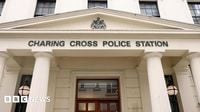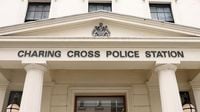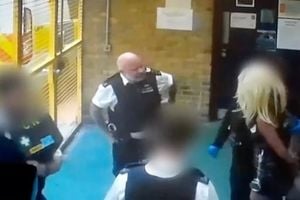On the evening of October 2, 2025, a Metropolitan Police sergeant based at Charing Cross Police Station in central London was arrested on suspicion of perverting the course of justice—a move that has sent ripples through both the police force and the public, already reeling from recent revelations of deep-seated misconduct. The arrest, carried out by the Met’s Directorate of Professional Standards, follows a BBC Panorama undercover investigation that exposed a culture of racism, misogyny, and brutality among officers at the station, sparking outrage and calls for urgent reform.
The officer in question, attached to the Central West Basic Command Unit, has since been bailed and suspended from duty, according to a Metropolitan Police statement. The allegation against the sergeant relates to an incident at Charing Cross Police Station on the same day as the arrest and is directly linked to matters disclosed in the BBC Panorama documentary. The Independent Office for Police Conduct (IOPC) has been informed and is independently investigating the allegations.
The BBC Panorama investigation, led by undercover reporter Rory Bibb, who worked for seven months as a designated detention officer in the Charing Cross custody suite, recorded officers making racist and misogynistic remarks, dismissing rape victims, and openly boasting about the use of excessive force. The footage, which aired to national shock, showed officers calling for immigrants to be shot, making derogatory comments about Muslims and women, and laughing about police brutality—including incidents involving vulnerable suspects.
One off-duty officer was captured on camera saying about immigrants, “Either put a bullet through his head or deport him. And the ones that s, rape women, you’d do the c and let them bleed out.” Another officer described an “invasion” of migrants, adding, “The Somalians are scum. Any foreign person is the worst to deal with.” On another occasion, an officer remarked, “Islam is a problem. A serious problem I think. Muslims hate us. They f****** hate us. Proper hate us.” The documentary also revealed officers making sexual comments about detained women and boasting about using force, with one officer saying, “I love taking fingerprints by force.”
The undercover footage also included disturbing accounts of police brutality. In one shocking incident, an officer recounted tormenting a 17-year-old autistic teenager by applying pressure points in a police van, later restraining him with up to eight officers for two hours after the teenager threw a pillow. Another constable allegedly offered to make a false statement to blame a suspect for lashing out, after witnessing another officer kneeling on the suspect’s leg.
The fallout from the Panorama investigation was immediate and dramatic. The BBC provided the Metropolitan Police with a detailed list of allegations once filming concluded. In response, the Met suspended eight officers and one staff member, removing two more officers from front-line duties. Nine serving officers, one ex-officer, and a designated detention officer are now under investigation for gross misconduct, including racism, misogyny, anti-Muslim sentiment, and excessive use of force. The entire Charing Cross custody team has been disbanded and reassigned elsewhere, a move described as necessary to restore public trust and internal accountability.
Deputy Assistant Commissioner Andy Valentine, responsible for Professionalism within the Met, emphasized the force’s determination to root out corruption and misconduct. “We have been extremely clear we will be unrelenting in our approach to tackling issues at Charing Cross, and anywhere else across the Met,” Valentine stated. “This fresh matter came to light through our internal reporting mechanisms and we continue to encourage and support all our officers and staff to report allegations of criminal and conduct behaviour so we can act swiftly. Professional standards officers immediately acted to make the arrest and the officer has been suspended from duty. We will not hesitate to take rapid action around any further allegations, as part of our deeper probe into corruption and ridding the Met of those who are not fit to serve the people of London.”
Met Commissioner Sir Mark Rowley echoed these sentiments, describing the behavior exposed by Panorama as “disgraceful, totally unacceptable and contrary to the values and standards” of the force. He sought to reassure the public that “people in London could trust the vast majority of the force’s officers,” but admitted he was “horrified” by the documentary’s findings. Rowley stressed the importance of transparency and swift action, saying that those found guilty of gross misconduct would be “kicked out of the force within weeks if found guilty on incontrovertible evidence.”
The Prime Minister, Sir Keir Starmer, weighed in on the controversy earlier this week. “I’ve not yet seen the footage, but I’ve had it described to me, and it’s shocking, and I’m glad the commissioner is responding. He needs to be very robust in his response,” Starmer said, underscoring the gravity of the situation and the need for decisive leadership at the highest levels of the police service.
The IOPC, which is independently investigating the allegations at Charing Cross, has confirmed it is looking into claims of excessive use of force, discriminatory and misogynistic comments, and failures to report or challenge inappropriate behavior. One constable is also facing a criminal investigation for allegedly perverting the course of justice, further highlighting the seriousness of the allegations and the breadth of the inquiry.
Public trust in the Metropolitan Police has been severely tested in recent years by a string of scandals, but the revelations from Charing Cross have struck a particularly raw nerve. The undercover Panorama footage has reignited debate about institutional racism, sexism, and the culture of silence within the force. Commentators and advocacy groups have called for comprehensive reforms, including greater oversight, better training, and more robust mechanisms for officers and staff to report wrongdoing without fear of reprisal.
In the wake of the Panorama investigation, the Met’s internal reporting mechanisms have been credited with bringing the latest allegations to light swiftly. Valentine noted that the force “continues to encourage and support all our officers and staff to report allegations of criminal conduct and behaviour so we can act swiftly.” This commitment to internal accountability, he argued, is vital if the Met is to restore confidence and demonstrate that it is serious about confronting misconduct head-on.
As the investigation continues, the Metropolitan Police has stated that it would not be appropriate to go into further detail at this time. The officer at the center of the latest arrest remains suspended from duty, and the outcome of the IOPC’s inquiries is awaited with keen interest by both the public and the wider law enforcement community.
For Londoners and observers nationwide, the events at Charing Cross Police Station serve as a stark reminder of the importance of vigilance, transparency, and accountability in public institutions. The coming weeks will show whether the Metropolitan Police can live up to its promises of reform and truly begin to repair the damage done.






